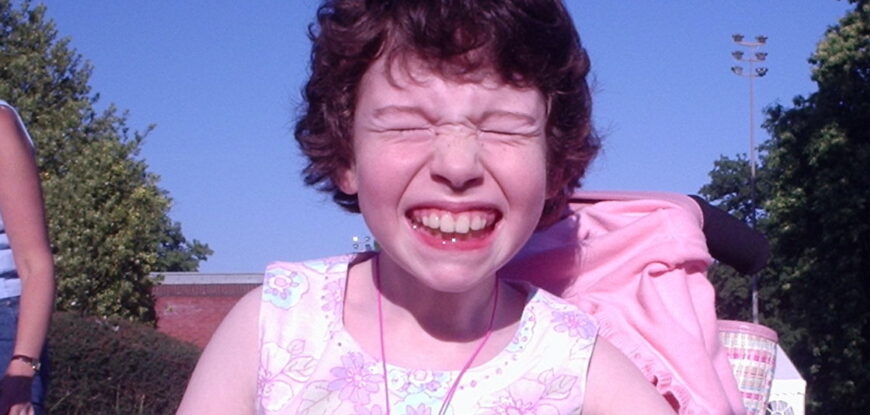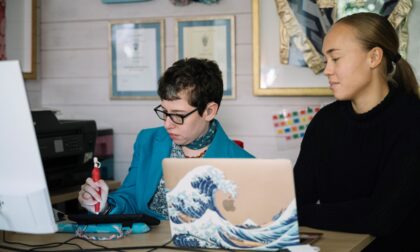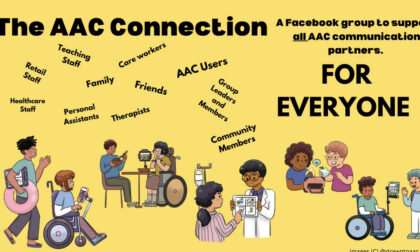I’ve been speaking in public since I was 11, back in 2005. The very first time I was in front of an audience I felt hesitant but I got really good feedback. I’d been asked to share a few thoughts about how I felt as a communication aid user with other users and their parents at a family day. This blog stems from my reflections when I found an old presentation made aged 12 about using AAC and my thoughts at 10 years old. Then how it fuelled my love of public speaking with some up-to-date reflections on what I’d said when I was 10 in 2004.
“My life story”, aged 10!
I’d felt able to take on that first invite about being a user of AAC and my thoughts at 10 years old. Why? Because I had written ‘my life story’ over a 3-day period when I’d been off school sick. I’d been inspired by Tracy Beaker. Tracy was a character in the Jacqueline Wilson book of the same name. Whilst I’d been ill I had watched the TV series and Tracy had been encouraged to write her life story by her social worker to come to terms with being in care. My life was nothing like Tracy’s but I felt different from my peers and just wanted to share my thoughts and feelings. I worked on this solidly for 3 days, handwriting, typing and eventually asking Mum to scribe for me as I got tired each day. I remember Mum crying when she read my final work, so clearly I made an impression on her!
What my 10-year-old self was thinking
The key points I made at the age of 10 were:
- “I believe in myself, I can do anything I want.”
- At times I felt angry, sad and left out.
- What I disliked about AAC.
- What I liked about AAC.
- The importance of newly found role models.
- My future dreams and my next challenges.
Enduring thoughts
Anyway, the short story is my work got published in the Communication Matters Journal. On a personal level, it made for interesting reading to go back and review that paper. In many ways, nothing in my life has changed. In many ways I still feel the same today as I did back then in 2004, even my dreams have endured! Of course, some things have moved on. No-one can imagine at the age of 10 what their life will hold nearly 2 decades on.
Setting out using AAC and public speaking
As a result of this story, I ended up going to my first International Society for Augmentative and Alternative Communication (ISAAC) conference. That was in Dusseldorf in 2006. I was the then youngest ever person to present a paper. That experience set me on my public speaking journey today. I loved that I had a very full room of people who sat quietly and listened to me, asked questions and waited for me to reply and then at the end applauded my efforts. Throughout the rest of the week-long conference, people sought me out to talk to me.
Feeling respected and valued
For the first time in my life, presenting at ISAAC in 2006 I felt valued and respected outside of my family home. Strangers were listening to me and asking questions about my thoughts and feelings. Not just that, they were seeking my opinions on other AAC-related topics. This experience has far-reaching consequences. I changed schools, became an active writer at home and wanted to repeat this experience at the earliest opportunity. Without ever meaning my AAC and public speaking career was born, based on my lived experiences.
Since that first ISAAC conference, I have come across more and more AAC users’ public speaking. This can only be good. I’m a strong advocate of ‘nothing about me without me’ and so our views about communication and using AAC are important.
18 years on. A greater understanding, but no new answers
I’m not sure even now I have the answers to some of the points I was making as a pre-teen. I do, however, have a greater understanding of why I felt the way I did back then.
Self-esteem and confidence
The self-belief that I can achieve has persisted, and without a doubt, I’ve achieved my dreams and more. Sure, I have regular wobbles but two sayings that have helped me since I was little, and I still use today are:
I’m the best me I’ve got as I’m the only me I’ve got.
And
No-one can make you feel inferior without your consent.
I’m not sure who said the first saying but I love some of Elenor Roosevelt’s quotes, including this second one. The sad thing, in my mind, is that actually from a societal perspective nothing has really changed. I still find there are times when I feel excluded. The feelings of being angry, sad and left out still bubble to the surface now and then. I could write a novel on the things that happen, but if you are interested take a look at my recent blog on Ableism and communication impairment.
Further reflections on being a user of AAC and my thoughts at 10 years old
My likes and dislikes as a communication aid user are still more or less the same as they were in 2006. You can see more about these on my communication partners page.
My belief in the value of role models has not diminished over time. In fact, some of my role models have been part of my life since 2006. You can read more in my recent blog post AAC role models.
Finally, most readers will know that dreams play an important part in my life. I’ve conquered some of those dreams I held as a 10-year-old through hard work and resilience. In nearly 2 decades my dreams have grown and evolved, but the same themes still hold true for me. I’ve got a whole section on my website dedicated to dreams and the dreaming process.
The final word
I’ve done a little bit of reading to see if my thoughts and feelings as a 10-year-old were typical of my peers. It seems so. At that age, children are developing their thinking skills. This means they enjoy sharing their points of view of their situation and the world around them. It also seems that children of this age often play in groups and become capable of socially excluding others. I guess not being able to keep up in the playground, and always having an adult with me, demonstrated my difference and hindered their explorations. This might explain why I often felt isolated and left out. It also seems I was at that age where children are developing coping strategies to deal with their own lived experiences. I guess I realised that my strategy was to share with those who might empathise because they were in a similar situation. Or, they worked within the field of AAC.
Opportunities
Who knew back in 2004 that being a user of AAC and my thoughts at 10 years old would lead me where I am today? I’m humbled by the opportunities and invitations that have come my way in the intervening years. The range of things I now have the privilege to speak about is diverse but is still grounded in my lived experiences. If you know me you will know my journey has been driven by my dreams leading to my academic and sporting success. Within this, I share the importance of determination, resilience and working hard to achieve your own life and communication potential. Tied into this I also lead workshops and sessions on identity, ableism, and dreams. And, along the way, there have been sessions on connectedness, leadership, living independently, literacy and AAC, synaesthesia and more.





If you found this interesting or
helpful please feel free to share.